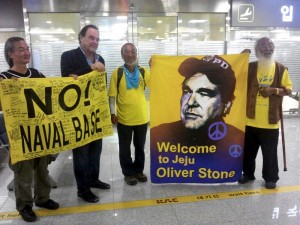Special to WorldTribune.com
By Donald Kirk, East-Asia-Intel.com
JEJU ISLAND, South Korea – The protest against building a South Korean navy base off the shore of a pleasant village on the southern coast of this “island of peace” by now seems a little tiresome.
No way will the hardy band led by priests and pastors stop construction. They’ve delayed the project by two or three years, but now it’s already half done while the noise of heavy machinery reverberates beyond the tall fences around the site.

The futility of the protest seems irrelevant to the Rev. Mun Jeong-hyun, the Catholic priest who conducts Masses every day in a small shelter across the road in Gangjeong village.
“Our protest is a failure,” says Mun, his white beard flowing as he looks toward the fence, festooned with anti-base signs and slogans. Still, he adds, “I will be here until I die.”
For sure, when the base hosts both South Korean navy ships and civilian cruise liners a couple of years from now, Mun will be outside the gates protesting with many of the same priests and nuns and pastors who’ve been crusading against the base for years.
But how much does their protest mean? What do people really think of these perpetual naysayers shouting their slogans, saying prayers, painting new signs and spreading the word in leaflets and interviews?
In the days before the 66th anniversary next week of “4/3,” that is, April 3, 1948, when civil strife erupted on Jeju in which 30,000 by minimal estimate were killed, the campaign against militarism has a certain relevance.
Jeju may now prosper from tourism, on top of its bounty of fat juicy oranges and other products of a year-round subtropical climate, but the memory of that slaughter is embedded in the subconscious of those who died in the relentless search for miscreants.
Another date, however, intrudes. That’s the fourth anniversary this week of the sinking of the navy corvette the Cheonan by a North Korean torpedo with a loss of 46 lives in the Yellow Sea. The anniversary is a reminder of looming dangers and the arguments for having a base on Jeju, guarding the shipping lanes around the Korean peninsula.
A Protestant pastor, visiting from south of Seoul, not in sympathy with the pastors at the protest, offers yet another reminder — the danger posed by the rising power of China. The base is needed, he says, to insure the Chinese do not make good on their claim to a rock formation that lurks a few meters below the surface, 149 kilometers southwest of here, 287 kilometers east of the China coast.
Both countries say the rocks — Ieodo to the Koreans, Suyan to the Chinese — are within their exclusive economic zones. South Korea has asserted its claim by attaching a helicopter pad to the rocks and installing meteorological and communications gear.
It’s hard to imagine a war breaking out over a bunch of rocks far out in the sea, but the danger is real enough for officials to say that’s one more reason for the base. In Gangjeong village, people say most of the anti-base protesters are from somewhere else, maybe Seoul or even foreign countries. Since completion of the base seems inevitable, it’s not uncommon to hear villagers wishing the protesters would just go away.
For the protesters, though, the danger is that the U.S. will use the base for its own warships, provoking a second Korean War or at least an attack on their treasured island.
Oliver Stone, the leftist film director, when he was here in August, accused the U.S. of plotting to use the base for just about every kind of chicanery including, drone strikes and nuclear warfare.
If Stone’s propaganda is less than convincing, you cannot get away from the fear that distant regional confrontations will someday destroy the beauty and tranquility of this island. In a real war, might U.S. and South Korean ships share the limited facilities of the small Gangjeong base while warplanes fly out of Alddreu airfield near the southwest edge of the island? The Japanese-built airfield has fallen into disuse, but who’s to say what would happen to the land, long since overgrown, in times of military need?
It’s difficult, however, to link the Americans directly to a conspiracy theory when it comes to the base. Rev. Mun flared up when asked if he’d seen any suspicious looking Americans entering or leaving the site.
“I do not want to talk,” he shouted. “America is the axis of evil.”
The priest’s angry words leave the impression, beyond rhetoric, there’s really no evidence to substantiate the claims of a U.S. base rising on Jeju. There’s no denying, though, that the clouds of war on distant horizons might one day turn into a regional conflagration in which the warnings and prayers of the protesters, unheeded, would echo through the years.
Columnist Donald Kirk is the author, most recently, of “Okinawa and Jeju: Bases of Discontent.” He’s at kirkdon@yahoo.com.

You must be logged in to post a comment Login